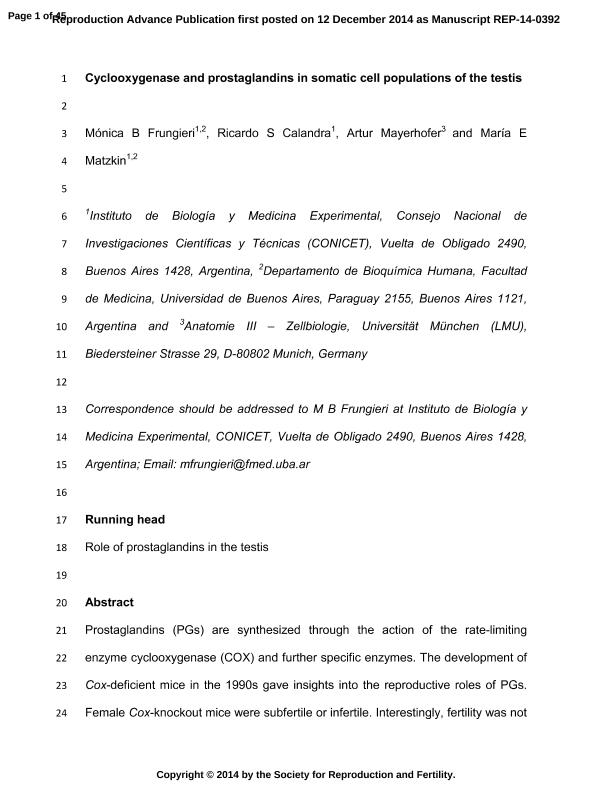Artículo
Cyclooxygenase and prostaglandins in somatic cell populations of the testis
Fecha de publicación:
04/2015
Editorial:
Bioscientifica
Revista:
Reproduction
ISSN:
1470-1626
e-ISSN:
1741-7899
Idioma:
Inglés
Tipo de recurso:
Artículo publicado
Clasificación temática:
Resumen
rostaglandins (PGs) are synthesized through the action of the rate-limiting enzyme cyclooxygenase (COX) and further specific enzymes. The development of Cox-deficient mice in the 1990s gave insights into the reproductive roles of PGs. Female Cox-knockout mice were subfertile or infertile. Interestingly, fertility was not affected in male mice deficient in Cox, suggesting that PGs may not be critical for the functioning of the testis. However, this conclusion has recently been challenged by observations of important roles for PGs in both physiological and pathological processes in the testis. The two key somatic cell types in the testis, Leydig and Sertoli cells, express the inducible isoenzyme COX2 and produce PGs. Testicular COX2 expression in these somatic cells is regulated by hormonal input (FSH, prolactin (PRL), and testosterone) as well as by IL1β. PGs modulate steroidogenesis in Leydig cells and glucose uptake in Sertoli cells. Hence, the COX2/PG system in Leydig and Sertoli cells acts as a local modulator of testicular activity, and consequently may regulate spermatogenic efficiency. In addition to its expression in Leydig and Sertoli cells, COX2 has been detected in the seminiferous tubule wall, and in testicular macrophages and mast cells of infertile patients. These observations highlight the possible relevance of PGs in testicular inflammation associated with idiopathic infertility. Collectively, these data indicate that the COX2/PG system plays crucial roles not only in testicular physiology (i.e., development, steroidogenesis, and spermatogenesis), but more importantly in the pathogenesis or maintenance of infertility status in the male gonad. Further studies of these actions could lead to new therapeutic approaches to idiopathic male infertility.
Palabras clave:
Testis
,
Male Fertility
,
Photoperiod
,
Prostaglandin
Archivos asociados
Licencia
Identificadores
Colecciones
Articulos(IBYME)
Articulos de INST.DE BIOLOGIA Y MEDICINA EXPERIMENTAL (I)
Articulos de INST.DE BIOLOGIA Y MEDICINA EXPERIMENTAL (I)
Citación
Frungieri, Monica Beatriz; Calandra, Ricardo Saul; Mayerhofer, Artur; Matzkin, Maria Eugenia; Cyclooxygenase and prostaglandins in somatic cell populations of the testis; Bioscientifica; Reproduction; 149; 4; 4-2015; R169-R180
Compartir
Altmétricas




